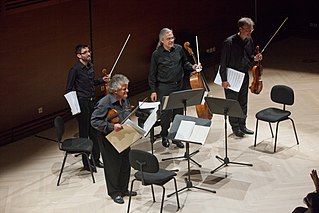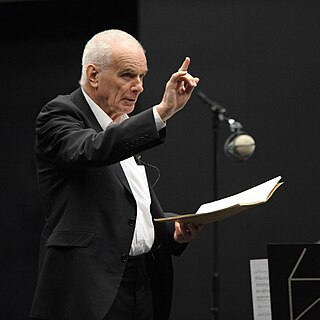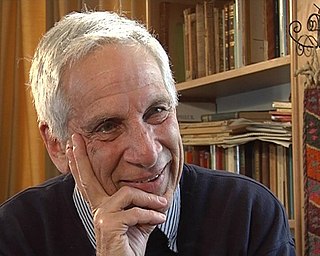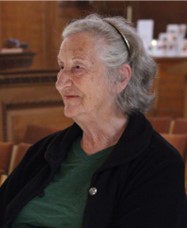Related Research Articles

In music, an aria is a self-contained piece for one voice, with or without instrumental or orchestral accompaniment, normally part of a larger work.

Sir Harrison Birtwistle was an English composer of contemporary classical music best known for his operas, often based on mythological subjects. Among his many compositions, his better known works include The Triumph of Time (1972) and the operas The Mask of Orpheus (1986), Gawain (1991), and The Minotaur (2008). The last of these was ranked by music critics at The Guardian in 2019 as the third-best piece of the 21st century. Even his compositions that were not written for the stage often showed a theatrical approach. A performance of his saxophone concerto Panic during the BBC's Last Night of the Proms caused "national notoriety". He received many international awards and honorary degrees.

The Arditti Quartet is a string quartet founded in 1974 and led by the British violinist Irvine Arditti. The quartet is a globally recognized promoter of contemporary classical music and has a reputation for having a very wide repertoire. They first became known taking into their repertoire technically challenging pieces. Over the years, there have been personnel changes but Irvine Arditti is still at the helm, leading the group. The repertoire of the group is mostly music from the last 50 years with a strong emphasis on living composers. Their aim from the beginning has been to collaborate with composers during the rehearsal process. However, unlike some other groups, it is loyal to music of a classical vein and avoids cross-genre music. The Quartet has performed in major concert halls and cultural festivals all over the world and has the longest discography of any group of its type. In 1999, it won the Ernst von Siemens Music Prize for lifetime achievement, being the first and only group to date to receive this award.

IRCAM is a French institute dedicated to the research of music and sound, especially in the fields of avant garde and electro-acoustical art music. It is situated next to, and is organisationally linked with, the Centre Pompidou in Paris. The extension of the building was designed by Renzo Piano and Richard Rogers. Much of the institute is located underground, beneath the fountain to the east of the buildings.

Serge Koussevitzky was a Russian-born conductor, composer and double-bassist, known for his long tenure as music director of the Boston Symphony Orchestra from 1924 to 1949.

Sir Peter Maxwell Davies was an English composer and conductor, who in 2004 was made Master of the Queen's Music.

Peter Alexander Goehr is an English composer and academic.

Thea Musgrave CBE is a Scottish composer of opera and classical music. She has lived in the United States since 1972.
Nicolas Hodges is a pianist living in Germany.
Peter Zinovieff was a British composer, musician and inventor. In the late 1960s, his company, Electronic Music Studios (EMS), made the VCS3, a synthesizer used by many early progressive rock bands such as Pink Floyd and White Noise, and Krautrock groups as well as more pop-orientated artists, including Todd Rundgren and David Bowie. In later life, he worked primarily as a composer of electronic music.
The Symphonies of Wind Instruments is a concert work written by Igor Stravinsky in 1920, for an ensemble of woodwind and brass instruments. The piece is in one movement, lasting about 9 minutes. It is dedicated to the memory of Claude Debussy, who died in 1918, and was premiered in London on 10 June 1921, conducted by Serge Koussevitzky.

Requiem is an instrumental musical composition by Hans Werner Henze, premiered in Cologne on 24 February 1993. It consists of nine sacred concertos for piano solo, trumpet and large chamber orchestra. About this piece, the composer has the following comments.
These nine instrumental pieces are concerned with the human fears and problems of our time, with illness and death, love and loneliness, and in particular with the character of Michael Vyner, an extremely lively and passionate man, his life and his death, and my grief at his loss which stands for the loss of so many others who have also tragically departed from our world. The spirit of this music can be explained by such facts and by our time, by which it seems to me to be strongly influenced, by its horrors and passions, its beauty and dynamics. The movements of the Requiem can be played separately or in any desired combination. Hans Werner Henze
The Melos Ensemble is a group of musicians who started in 1950 in London to play chamber music in mixed instrumentation of string instruments, wind instruments and others. Benjamin Britten composed the chamber music for his War Requiem for the Melos Ensemble and conducted the group in the first performance in Coventry.
A Garland for Dr. K. is a set of eleven short compositions created in 1969 for the celebration of the eightieth birthday of Dr Alfred Kalmus, the director of the London branch of Universal Edition. It is also the title of an album containing these eleven pieces of music, recorded in 1976.
Joseph Phibbs is an English composer of orchestral, choral and chamber music. He has also composed for theatre, both in the UK and Japan. Since 1998 he has written regularly to commissions for Festivals, for private sponsors, and for the BBC, which has broadcast premieres of his orchestral and chamber works from the Proms and elsewhere. His works have been given premieres in Europe, the United States and the Far East, and he has received prestigious awards, including most recently a British Composer Award, and a Library of Congress Serge Koussevitzky Music Foundation Award. Many of his works have been premiered by leading international musicians, including Dame Evelyn Glennie, Esa-Pekka Salonen, Leonard Slatkin, Sakari Oramo, Vasily Petrenko, Gianandrea Noseda, and the Belcea Quartet.
Panic is a concertante work for alto saxophone, jazz drum kit, woodwinds, brass and percussion by Harrison Birtwistle. It was written in 1995 and premiered as part of the Last Night of the Proms on 16 September 1995 at the Royal Albert Hall, London. At the premiere the solo saxophone part was played by John Harle, the drum kit by Paul Clarvis and the BBC Symphony Orchestra was conducted by Andrew Davis.

The Triumph of Time is a composition for orchestra by British composer Harrison Birtwistle written 1971 and 1972. It is one of Birtwistle's best-known compositions, as well as one of the works that earned him international reputation.
Michael Barrie Gordon Anderson, known as Barry Anderson, was a New Zealand-born composer, teacher, and pioneer in the dissemination of electroacoustic music in the United Kingdom. Internationally, his best-known work is his realisation of the electronic music for Harrison Harrison Birtwistle's opera The Mask of Orpheus.
Fiona Maddocks is a British music critic and author who specializes in classical music. Described as "one of the UK's leading writers and commentators on classical music", Maddocks has been chief music critic of The Observer since 2010. She held a central role in founding three media companies: BBC Music Magazine, Channel 4 and The Independent. Previously arts feature writer for the Evening Standard, Maddocks has also written for The Guardian and The Times. Her publications include a survey on the Medieval composer Hildegard of Bingen, a collection of interviews with Harrison Birtwistle, an anthology of 100 pieces recommended pieces, a guide to 20th-century classical music, and a study on Sergei Rachmaninoff's life outside of his native Russia.
References
- ↑ Hall, Michael. (1984) Harrison Birtwistle, Robson Books, p. 107
- ↑ BBC: "What's On: Silbury Air (1977, rev. 2003)", accessed February 28, 2011